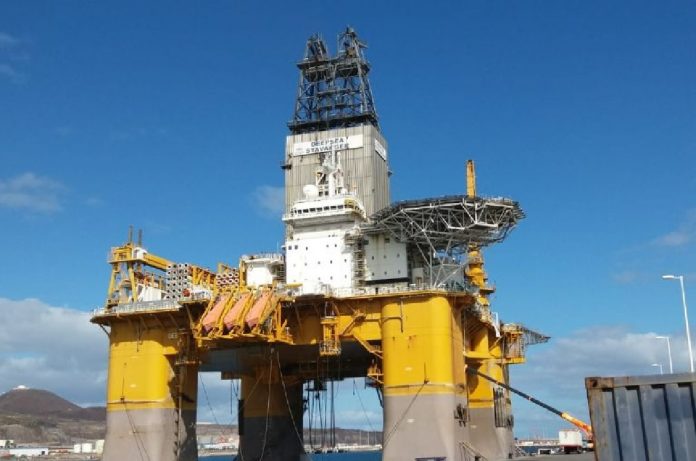
The South Africa fishing industry needs to keep a close eye on the gas exploration activity happening off the south coast of South Africa. There has been mixed response to Total’s recent announcement that it has made another significant gas condensate discovery in the Outeniqua Basin.
Notably, there is the sense that the South African government has rushed the process to finalise the environment and social impact assessment application. This so that Total and its energy partners can undertake additional exploration activities.
Although a lot of the work had already been done by SLR Consulting (South Africa) (Pty), the Final Scoping Report (incorporating the comments received during the review and comment period) was only submitted to the Petroleum Agency of South Africa (PASA) on 4 September 2020 for consideration and review.
Just a few weeks later on 12 October, the Department of Mineral Resources and Energy (DMRE), signed it off.
The information is available to read on the SLR website.
Scope of project
Total as the operator, has received permission to explore 10 wells. The Luiperd prospect, located on Block 11B/12B in the Outeniqua Basin, is just 45 – 135 km off the coast.
It is the largest of five prospects identified in the southwest corner of the nearly 18734 km² block. It is at least 50% bigger than Brulpadda in area size with water depths ranging from 110 to 2300 metres.
On 28 October, Total reported it had encountered 73 metres of net gas condensate pay in well-developed good quality lower cretaceous reservoirs.
“We are very pleased with this second discovery and its very encouraging results, which prove the world-class nature of this offshore gas play,” said Arnaud Breuillac, President Exploration & Production at Total.
‘’With this discovery and the successful seismic acquisitions, Total and its partners have acquired important data on the Paddavissie fairway. This will help to progress development studies and engage with South African authorities regarding the possible conditions of the gas commercialisation.”
Larger net pay
The net pay encountered in the Luiperd target objective is significantly larger than the main reservoir at last year’s Brulpadda discovery.
This is confirmed by Canadian firm Africa Energy, which is part of the operating consortium. Africa Energy’s chief executive Garrett Soden told the Africa E&P Virtual Summit recently: “As we move east… the oil column will likely increase because the overburden is decreasing at deeper water levels, which indicates lower temperature and pressure at the source rock.”
“The prospect also offers a more than 80% chance of success, which is “unheard of in frontier exploration today,” Soden said.
He added that drilling and evaluation will be completed in the fourth quarter, when drilling will start on a third prospect, Blaasop.
The oil and gas exploration drilling campaign, which is expected to be between 180 – 300 days long, will see about R1.5 billion invested in the South African economy.
Total has a 45% working interest, alongside Qatar Petroleum (25%), CNR international (20%) and Main Street, a South African consortium (10%).
What the fishing industry needs to watch
Given the rush to finalise the EIA, the fishing industry should make sure that its needs have been fully addressed.
While the document’s content of the commercial focus on the biological environment was not altered much, there are changes to parts of the text. One is to highlight that the northern portions of the block around the 200 m isobath are considered vulnerable. Particularly the deep reefs Kingklip Koppies and the Agulhas and Kingklip Ridges located along the northernmost portion of the Block 11B/12B which are assessed as endangered.
Also included in the final scoping report are a few paragraphs about recreational, artisanal and small-scale fishing and where these activities occur along the coastline. Note is also made that the fishing sectors that could be directly affected are traditional line fish, squid, white mussel and oysters, and hake handline.
Effect on marine ecology
The key issues around the effect on the marine ecology highlighted in the earlier report remain intact. However, the fishing industry should follow up to ensure that what has been said has in fact been done.
This includes a marine ecology assessment and obtaining input from the noise, drilling discharges and oil spill modelling studies. This to assess the potential impacts related to increased underwater noise, the discharge of cutting and muds as well as accidental oil spills on the marine ecosystem and biota, including sensitive marine areas.
“We were able to negotiate that seismic activity be delayed until the middle of January this year,” the SA Squid Management Industry Association reported at its AGM last week.
“We are busy working with FishSA and other fishing sectors to develop a task team and find a consultant to assist the industry in monitoring all of the developments related to this.”
Environmental concerns
The revised report also takes on board that in terms of Section 24P of NEMA, the ESIA must include an estimation of the financial provision determination required for the proposed additional exploration activities.
Such provision does not include for the management of unplanned events such as well blow-out but Total and partners must ensure the necessary insurances are in place to manage the consequences of any unplanned event.
Proof of such insurance also had to be submitted to the regulator before activities were allowed to commence.
South Africa does have a National Oil Spill Contingency Plan, a Marine Oil Pollution Bill and funding mechanisms to regulate and co-ordinate responses to oil spills.
Oil Spill Preparedness. Is South Africa Ready?
Reaction
While gas discovery could potentially deliver a huge economic boost for South Africa, not everybody is thrilled at the announcement.
The environmental lobby is particularly concerned. In August, the South Durban Community Environmental Alliance (SDCEA) called for the online public participation process to be stopped. It said they are “destroying our ocean one block at a time and are continuing to contribute to climate change”.
The main objection was to the apparent urgency of proceeding with the application during the COVID-19 lockdown. The choice of public participation process was according to SDCEA “not meaningful participation, according to the National Environmental Management Act.”
It warned, “this exploration will impact on small-scale/subsistence and commercial fishers in South Africa. An oil spill can devastate the coastline and affect the many industries, such as the tourism, recreation and the fisheries industry, as well as destroy the biodiversity.”
Extinction Rebellion in Cape Town believes the project must be stopped. It is on record that the “development of new fossil fuel projects at this time is nothing less than a crime against humanity. Those ignoring these urgent warnings from scientists all over the world will see themselves charged for these crimes in the near future,” it says.
Gas is a fossil fuel with significant global warming potential, say experts.
A climate justice campaigner at 350.org, envisages gas as the “next battleground” in South Africa.
“Gas is the new coal, so to speak. It’s the new big source of pollution and is also the new source of centralised fossil fuel projects, which are centres for patronage and corruption in ways renewable energy is not …
“The president’s economic recovery plan was all about shortening environmental regulations and tapping into South Africa’s vast oil and gas reserve,” it says.
The Green Connection, which supports and empowers local communities along country’s coastline, says if there is an oil spill from this offshore drilling, it will affect the Tsitsikamma and Wilderness National Parks and many fish-breeding areas.
GroundWork warns the repercussions of oil leaks and spills could “devastate the Southern African fishing industry and our shores as we have witnessed in Mauritius.
“Total and its contracting vessels have not committed to covering the economic costs of clean-up operations and compensations for impacts on ecosystems and livelihoods. South Africa cannot afford the risk that Total brings to our country,” it says.
Greenies Up the Anti on Oil and Gas Exploration
Government stance
The South African Mineral Resources and Energy Department believes oil and gas finds could be a game-changer for the economy.
Mineral Resources and Energy Minister, Gwede Mantashe, maintains: “The arrival of the drill rig Deepsea Stavanger reaffirms confidence in South Africa as an investment destination of choice for the exploration of oil and gas.
“Government will be supporting this project by finalising the Upstream Petroleum Bill which aims to strike a balance between the need to attract investment into this key sector of the economy and ensuring that oil and gas activities do not happen at the expense of the environment and water resources.”
Read his latest statement at Africa Oil Week last month.
https://www.gov.za/speeches/minister-gwede-mantashe-africa-oil-week-9-oct-2020-0000
Gas agenda vs fossil free
There’s clearly a determination within the Department of Mineral Resources and Energy to drive a gas agenda, alongside “clean coal”, says David Hallowes of environmental justice action group groundWork.
“The government thinks Total’s Brulpadda gas find in the Outeniqua Basin is a windfall, “but it will not be on anything like the scale of Mozambique.”
Meanwhile Fossil Free South Africa and 350 Africa have congratulated the City of eThekwini/Durban on becoming the second South African city to commit to phasing out investments in climate-breaking fossil fuels.
The Durban Climate Action Plan released in September forms part of a drive by 96 cities across the world to address climate change under the banner of the C40 Cities Network, whose goals are linked to the 2015 Paris Climate Agreement.
The eThekwini commitment was announced in late September, when the Mayors of Durban and Cape Town joined a group of 12 mayors from North America, Europe and Africa.
They promised “to shift their money out of fossil fuels and into green energy, buildings, transport and other investments to help them recover from the pandemic and tackle climate change.”
Media reports noted that eThekwini has embedded its divestment commitment in a new climate action plan. Desmond D’Sa, of South Durban Community Environmental Alliance (SDCEA) believes eThekwini is “not serious about protecting the environment” and that “no major polluter has been fined or prosecuted”.
eThekwini is the second South African city to commit to fossil fuel divestment. Cape Town was the first, making its commitment in June 2017.
“Our congratulations come with a caution. In the three years since Cape Town made its divestment commitment, we have heard nothing that suggests it has yet done anything to actually move money out of fossil fuel-compromised investment instruments.
“We suggest journalists ask Cape Town city managers tough questions on that issue,” says David Le Page, Coordinator of Fossil Free South Africa.


















